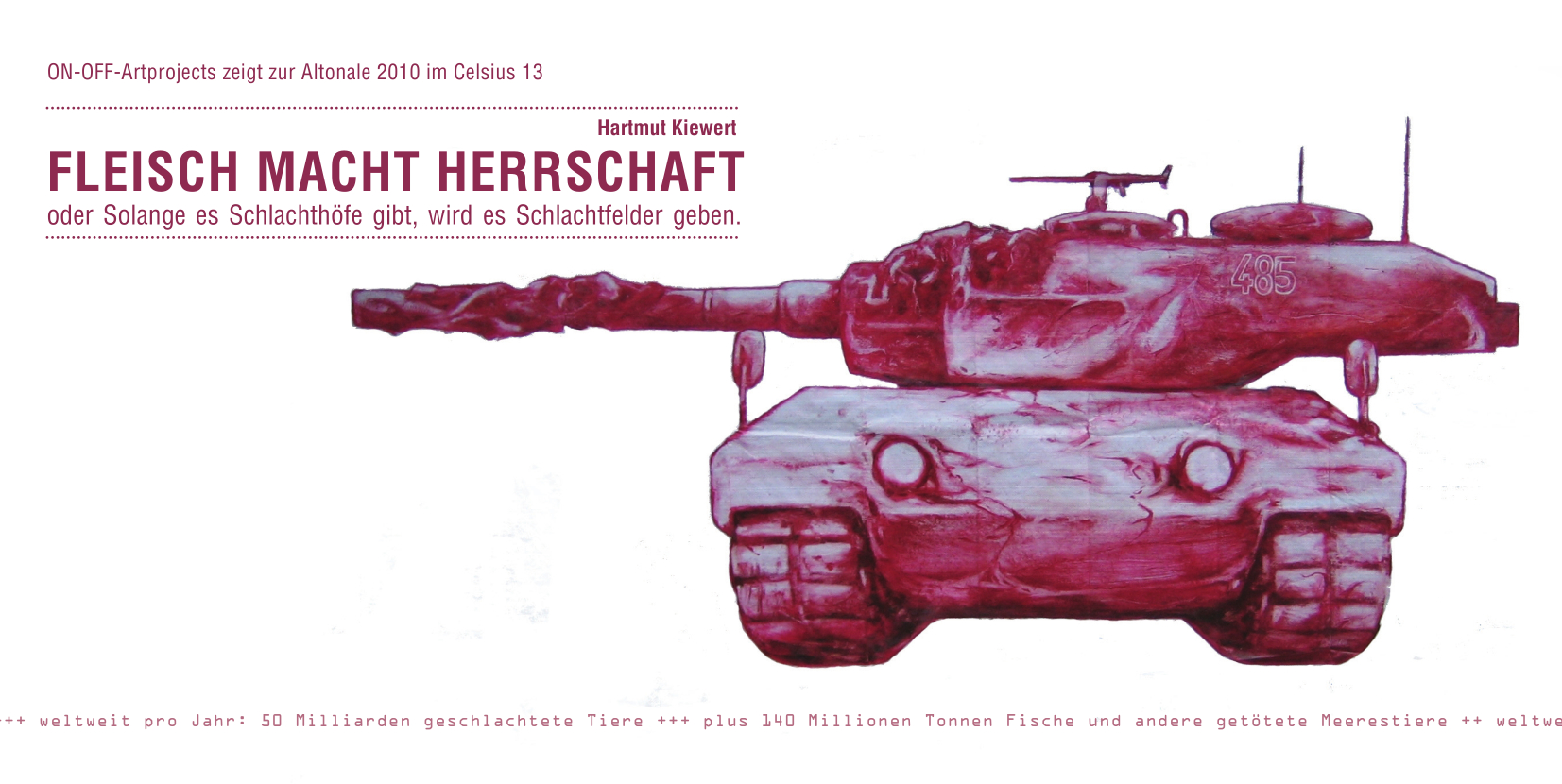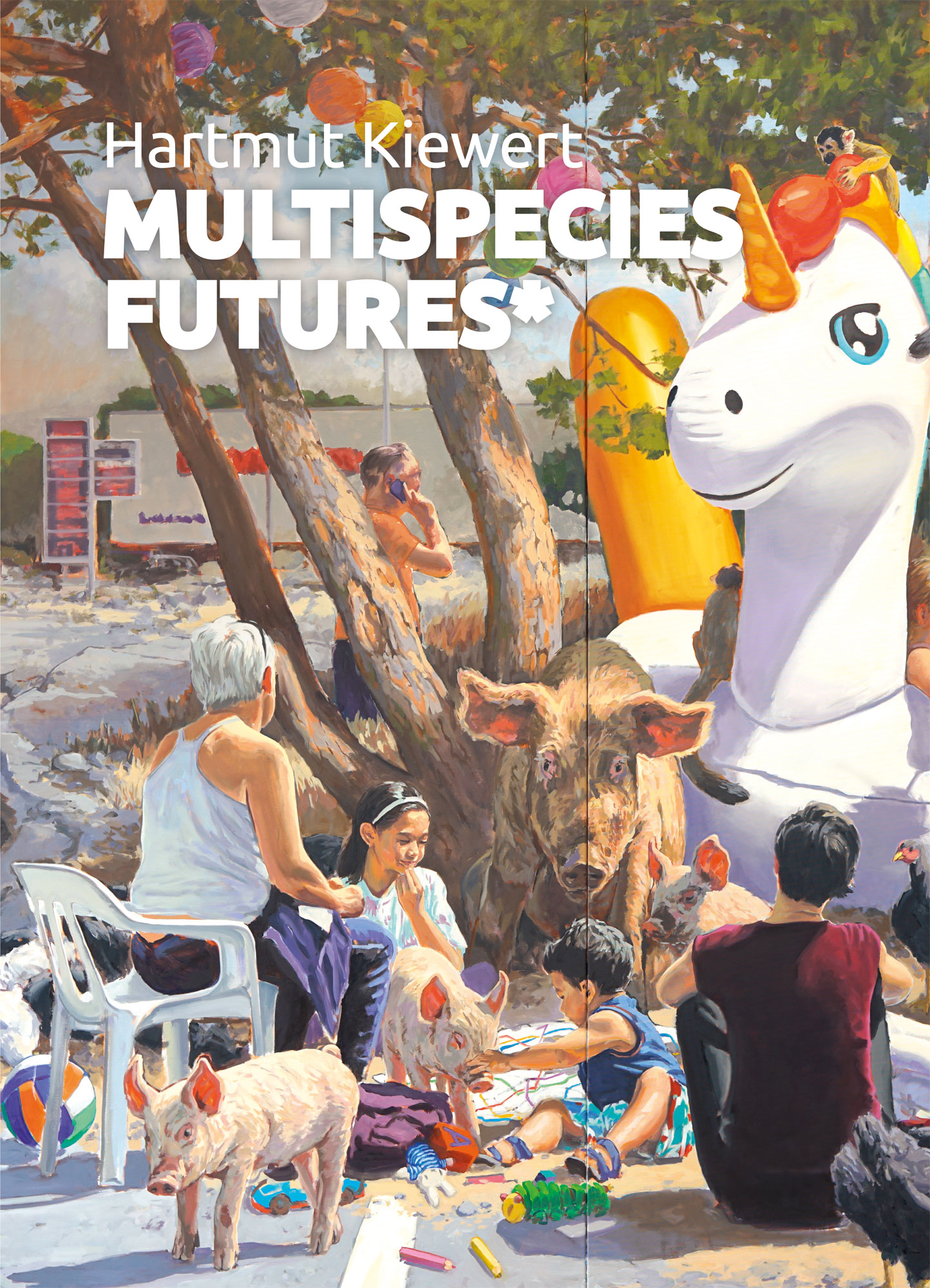Solo exhibition at Celsius 13, Hamburg (www.on-off-artprojects.de)
open: daily, except Mon, 16 to 29 June + 02, 03, 04 July, 15 – 20 h and by appointment
on sunday, 04 june, 19 o’clock: finissage
This was the last exhibition in the former sausage factory at Celsius 13.
Hartmut Kiewert
FLESH MAKES RULE
The moment of total access to the body through violence is the moment of the exercise of absolute power.
Thus, on the one hand, the consumption of meat still stands today as a symbol of domination and as a metaphor for this total access. On the other hand, a life is de facto extinguished, i.e. power is applied in its most extreme form in order to appropriate parts of the animal body.
The radical separation between man and animal, which has been inscribed in human culture for centuries, brings to light a form of violence which in its quantity has never possessed such astronomical proportions as today.
The spirit-matter dualism is deeply anchored in our thinking. It separates into a spiritual-reasoning and a physical-driving sphere and plays an essential role in the legitimation of the violent handling of humans with non-human living beings.
Living beings are hierarchically categorized as rational and instinct-driven, superior and inferior. According to this understanding, animals are not independent subjects, but only objects and can thus be used and consumed at will in the service of humans for the most diverse purposes as resources.
For the most part, they are not even perceived as individuals with their own desires, needs and interests. They are imprisoned to millions and millions and executed according to the interests of humans.
The interests of the animals are suppressed. The relationship of man to animal is a relationship of domination.
Man constructs his own superiority by devaluing the animal or the stranger. Our culture is characterized by a hierarchy, at the top of which is the white, healthy, male human being and at the bottom of which is the animal, abandoned to exploitation and free availability.
According to the critical theory of the Frankfurt School, not only nature is made subject. But also the undesirable parts of man himself, which are considered animalistic, are suppressed or dismissed as barbaric, primitive or effeminate and emotional.
In this way, interhuman relations of oppression can also be legitimized by projecting oppressed human groups into the realm of the animalistic, the unreasonable. For example, women or people assigned to a so-called other “race” were and are considered less valuable. They are thus more unquestioningly exploitable. The social position determined by property and power relations is reinterpreted as a quasi “natural” role. The actual relations of domination
At the same time, a friend/enemy or good/evil schema is built on this figure of thought, which is supposed to confirm one’s own hegemonic position. One’s own negative characteristics are projected into the foreign and can be fought and eradicated there as manifestations of evil.
Thus, wars can be waged in the name of God, in the name of the nation, in the name of democracy or any other ideology against witches, communism, terror or evil. The fact that one’s own borders, prisons and bombs are no less terror is then no longer noticeable.
The trained indifference to the suffering we inflict on animals is, in this sense, a hardening against an “effeminate” compassion. Compassion, however, could break through the mendacity of one’s reasoning in terms of enemy images or structures of oppression. On the plate, in a certain sense, the serious case is permanently practiced in uniform.
Max Horkheimer writes about this in 1959 in “The Right of Animals”:
“Between the cluelessness towards the outrages in totalitarian states and the indifference towards the meanness committed on animals, which also exists in free (societies)there is a connection. Both thrive on the stubborn complicity of the masses in what is happening anyway.”
In my opinion, the question of the perspective for a good life of people cannot be separated from the specific view of “the animal”. Especially because industrial animal production has extremely negative ecological and social effects.
According to Michel Foucault’s analysis of power, the state exists because there are certain relationships between man and woman, between adult and child, and – to add – between man and animal. Accordingly, domination is not one-dimensional, but multi-layered and interconnected. Changing existing relations can only happen at the level of everyday practice. It must begin in the immediate relationships between individuals.
In relation to animals, this means first of all quite simply to renounce the consumption of any products that have been created through the exploitation of animals.
“As long as there are slaughterhouses, there will be battlefields”.
Leo Tolstoy















